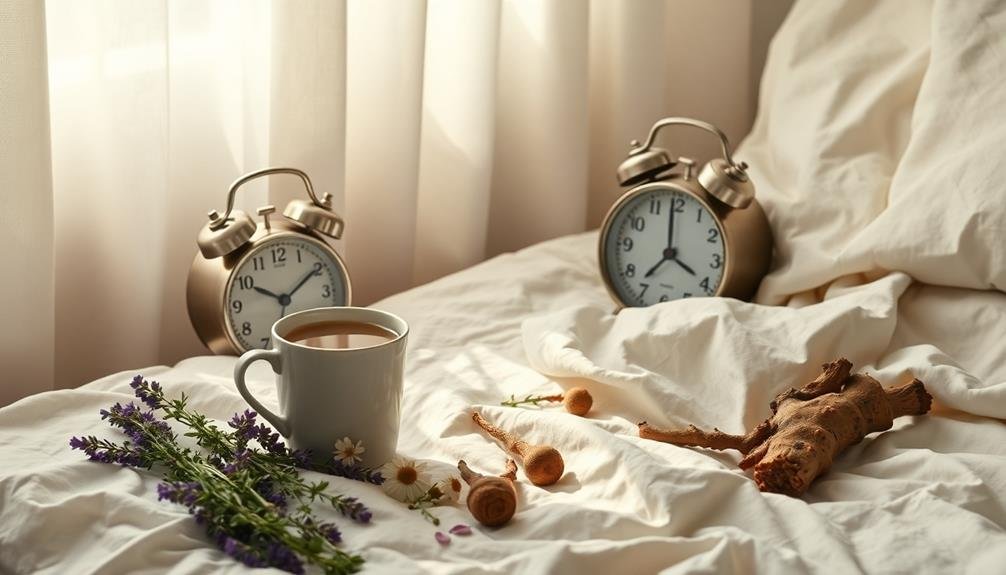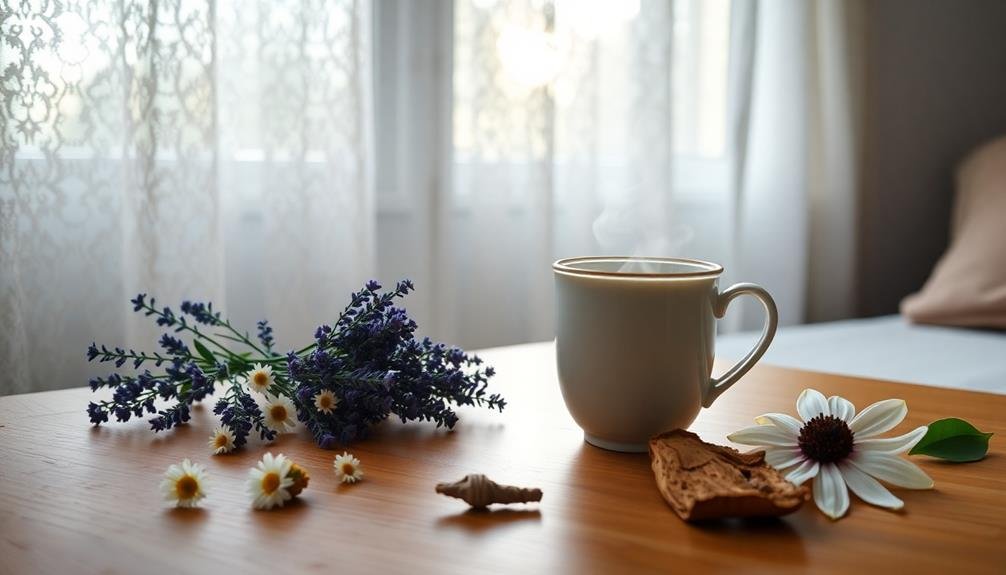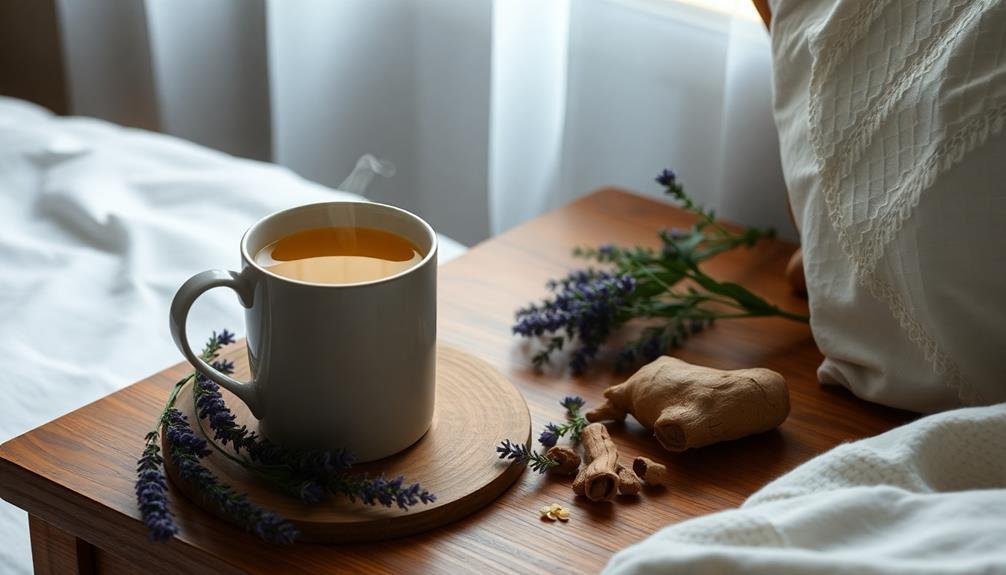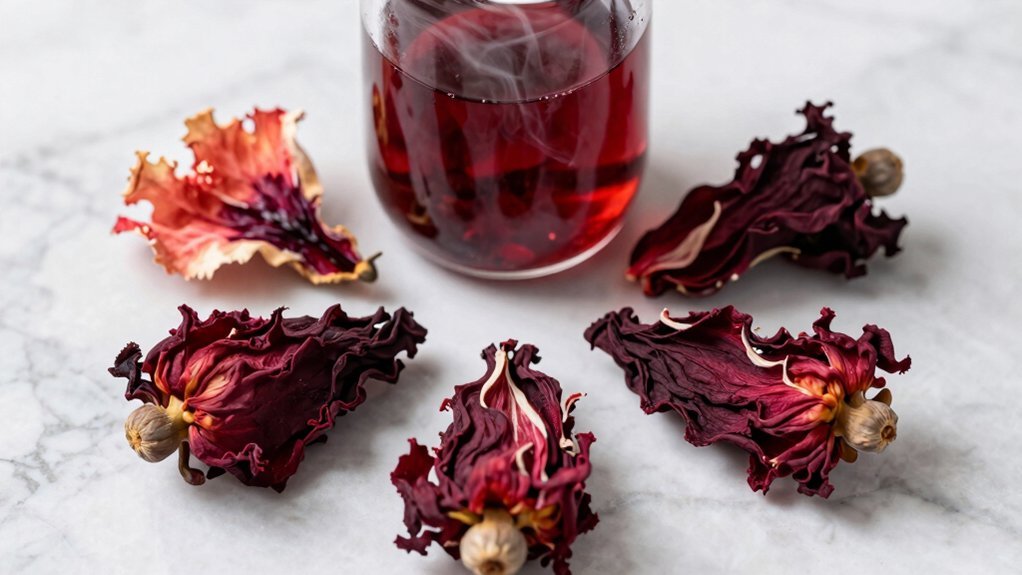For a calming herbal tea blend that promotes better sleep, try combining chamomile, valerian root, lavender, and lemon balm. Chamomile's apigenin and valerian's GABA-boosting properties work together to reduce anxiety and induce relaxation. Lavender's linalool adds aromatherapeutic benefits, while lemon balm enhances mood and sleep quality. Steep 1 teaspoon of this blend in hot water for 5-10 minutes, and drink 30-60 minutes before bedtime. Start with one cup nightly and adjust as needed. Remember to use fresh, cold water and cover your cup while steeping to retain essential oils. Discover how this soothing blend can transform your nightly routine and improve your sleep.
Understanding Sleep Issues

While many people struggle with sleep issues, understanding the root causes is essential for finding effective solutions. You might be experiencing insomnia, which can manifest as difficulty falling asleep, staying asleep, or waking up too early.
Stress, anxiety, and depression are common culprits behind sleep disturbances. Your body's natural circadian rhythm can also be disrupted by irregular sleep schedules, shift work, or jet lag.
Physical factors like chronic pain, sleep apnea, or restless leg syndrome can greatly impact your sleep quality. Certain medications, caffeine, alcohol, and nicotine can interfere with your ability to fall asleep or stay asleep throughout the night.
Environmental factors such as noise, light, or an uncomfortable sleeping environment may also contribute to sleep issues.
It's important to identify your specific sleep problems and their potential causes. Keep a sleep diary to track your habits and patterns. Note your bedtime routine, sleep duration, and any disturbances you experience.
This information can help you and your healthcare provider develop targeted strategies to improve your sleep quality and overall well-being.
Benefits of Herbal Tea
Once you've identified your sleep issues, you might consider natural remedies to improve your rest. Herbal tea offers a gentle, caffeine-free approach to promoting better sleep. These soothing beverages can help relax your mind and body, preparing you for a more restful night.
Many herbal teas contain compounds that interact with your body's natural sleep-regulating processes. For example, chamomile tea is rich in apigenin, an antioxidant that binds to specific receptors in your brain, potentially reducing anxiety and initiating sleep.
Valerian root tea may increase the production of gamma-aminobutyric acid (GABA), a neurotransmitter that promotes calmness and tranquility.
Lavender tea is known for its calming aroma and potential to reduce stress and anxiety, which can interfere with sleep.
Passionflower tea may help manage mild sleep irregularities and restlessness. Additionally, lemon balm tea has been shown to improve sleep quality and reduce symptoms of insomnia.
Essential Herbs for Sleep

You'll find several herbs particularly effective for promoting sleep.
Chamomile, valerian root, and lavender are among the best-known sleep-inducing botanicals.
These herbs can work even better when combined, as their complementary properties create a potent blend for improved slumber.
Best Sleep-Promoting Herbs
The best sleep-promoting herbs have been used for centuries to help people achieve restful nights. You'll find that chamomile, valerian root, and lavender are among the most effective and well-known options.
Chamomile tea is renowned for its gentle, calming effects, making it an excellent choice for winding down before bed. Valerian root, while less pleasant-tasting, is a potent herb that can greatly improve sleep quality and reduce the time it takes to fall asleep.
Lavender, often used in aromatherapy, can also be consumed as a tea to promote relaxation and better sleep. Passionflower is another herb that's gained popularity for its ability to reduce anxiety and improve sleep quality.
Lemon balm, with its mild sedative properties, can help calm your mind and prepare you for rest. Don't overlook the power of ashwagandha, an adaptogenic herb that can lower stress levels and promote deeper sleep.
Herbal Synergy for Slumber
While individual herbs offer powerful sleep-promoting benefits, combining them can create a synergistic effect that enhances their overall impact. When you blend sleep-inducing herbs, you're not just adding their individual effects; you're creating a more potent formula that addresses various aspects of sleep troubles.
For example, combining chamomile's calming properties with valerian's sedative effects can help you both relax and fall asleep faster. Adding lavender to this mix introduces aromatherapeutic benefits that further soothe your senses.
Passionflower can work alongside these herbs to reduce anxiety and racing thoughts, while lemon balm enhances mood and reduces stress.
To create an effective sleep blend, consider including at least three complementary herbs. Start with a base of chamomile or valerian, then add one or two supporting herbs like passionflower, lemon balm, or hops.
Don't forget to include herbs that address your specific sleep issues. If you struggle with anxiety, incorporate more calming herbs. For restlessness, focus on sedative herbs.
Experiment with different combinations to find the perfect blend that helps you achieve restful, rejuvenating sleep.
Chamomile: The Sleep Inducer
Renowned for its gentle sedative properties, chamomile has been a go-to herb for promoting restful sleep for centuries. This daisy-like flower contains apigenin, a compound that binds to specific receptors in your brain, potentially reducing anxiety and initiating sleep.
When you brew chamomile tea, you'll notice its sweet, apple-like aroma. This calming scent alone can help relax your mind and prepare your body for sleep. As you sip the warm infusion, the herb's natural compounds work to ease tension and promote a sense of tranquility.
Chamomile doesn't just help you fall asleep; it may also improve your sleep quality. Research suggests that regular consumption can increase the duration of deep sleep phases, leaving you feeling more refreshed upon waking.
To maximize chamomile's sleep-inducing benefits, steep one to two teaspoons of dried flowers in hot water for 5-10 minutes. Drink this soothing tea about 30 minutes before bedtime.
You can enhance its effects by combining it with other sleep-promoting herbs like lavender or valerian root. Remember, consistency is key – make chamomile tea a part of your nightly routine for the best results.
Valerian Root's Sedative Properties

You'll find valerian root has been used for centuries as a natural sleep aid.
Its sedative effects are thought to stem from increasing gamma-aminobutyric acid (GABA) levels in the brain, promoting relaxation and calmness.
You can consume valerian root as a tea, tincture, or capsule, typically in doses of 300-600mg before bedtime.
Traditional Sleep Aid Uses
For centuries, herbalists have turned to valerian root as a potent natural sleep aid. This herb's traditional uses span across various cultures, with ancient Greeks and Romans relying on its calming effects. You'll find that valerian root has been a go-to remedy for insomnia, anxiety, and restlessness throughout history.
In medieval Europe, valerian was often called "all-heal" due to its widespread therapeutic applications. You might be surprised to learn that it was even used to treat epilepsy and nervous disorders.
During World War II, people in England used valerian to relieve stress and anxiety caused by air raids.
Today, you can find valerian root in many forms, including teas, tinctures, and capsules. It's often combined with other relaxing herbs like chamomile and passionflower for enhanced sleep-promoting effects.
When brewing a valerian tea, you'll typically steep the root for about 10-15 minutes to extract its beneficial compounds.
While modern research continues to explore valerian's effectiveness, its long-standing use in traditional medicine speaks to its potential as a natural sleep aid. As with any herbal remedy, it's wise to consult with a healthcare professional before incorporating it into your routine.
Mechanisms of Action
The complexity of valerian root's sedative effects lies in its interaction with multiple neurotransmitter systems. When you consume valerian root tea, you're introducing compounds that primarily target your brain's GABA (gamma-aminobutyric acid) receptors. GABA is a neurotransmitter that helps calm your nervous system, reducing anxiety and promoting relaxation.
Valerian root contains valerenic acid and its derivatives, which enhance GABA's effects by inhibiting its breakdown. This leads to increased GABA levels in your brain, resulting in a sedative effect. Additionally, valerian interacts with adenosine receptors, which play a role in regulating sleep-wake cycles.
The herb also contains other active compounds like isovaltrate and valtrate, which contribute to its overall calming properties. These substances may influence serotonin receptors, further promoting relaxation and improving sleep quality.
It's important to note that valerian root's effects can vary among individuals due to differences in metabolism and sensitivity. The herb's full mechanism of action isn't entirely understood, as it contains over 150 chemical constituents that may work synergistically to produce its sleep-inducing effects.
Dosage and Preparations
Proper dosage and preparation are essential for harnessing valerian root's sedative properties effectively. For tea, steep 2-3 grams of dried valerian root in hot water for 10-15 minutes.
You'll want to strain the tea before drinking, as the root pieces can be quite fibrous. It's best to consume valerian tea about an hour before bedtime to allow its effects to kick in.
If you're using valerian root extract or capsules, follow the manufacturer's instructions, as potency can vary. Generally, a dose of 300-600 mg is recommended for sleep support. Start with a lower dose and gradually increase if needed.
Here's a quick guide to preparing valerian root tea:
- Measure 2-3 grams of dried valerian root
- Place the root in a tea infuser or bag
- Steep in 8 ounces of hot water for 10-15 minutes
- Strain and enjoy, adding honey or lemon if desired
Lavender for Relaxation
Known for its soothing aroma and calming properties, lavender has been a popular herb for relaxation for centuries. You'll find it's an excellent addition to your sleep-inducing tea blend. Lavender contains linalool, a compound that can reduce anxiety and promote relaxation.
When you steep lavender in hot water, you'll release its essential oils, creating a fragrant and calming beverage. The herb's mild sedative effects can help you unwind after a stressful day and prepare your mind for sleep. It's particularly effective in combination with other sleep-promoting herbs like chamomile or valerian root.
You can use either fresh or dried lavender flowers in your tea blend. If you're using fresh flowers, make certain they're organic and free from pesticides. For dried lavender, look for food-grade options specifically meant for culinary use. Start with a small amount, as lavender's flavor can be quite strong and potentially overpowering.
To get the most benefit from lavender in your tea, steep it for 5-10 minutes in water that's just below boiling. This will guarantee you extract the maximum amount of beneficial compounds without releasing any bitter flavors.
Passionflower's Calming Effects

Passionflower can be a powerful ally in your quest for better sleep.
This herb's anxiety-reducing properties stem from its ability to enhance GABA, a neurotransmitter that promotes relaxation in your brain.
You'll find that passionflower has been used traditionally in various cultures to calm nerves and improve sleep quality, making it a valuable addition to your nighttime tea blend.
Anxiety-Reducing Properties
Delving into the anxiety-reducing properties of this herbal blend, we find passionflower as a key ingredient. This powerful herb has been used for centuries to combat anxiety and promote relaxation.
When you sip on this tea, you're tapping into passionflower's natural ability to increase gamma-aminobutyric acid (GABA) in your brain, which helps calm your nerves and reduce stress.
The anxiety-reducing effects of passionflower extend beyond just helping you fall asleep. You'll notice:
- Decreased racing thoughts
- Reduced muscle tension
- Improved focus during the day
- Enhanced overall mood
GABA Neurotransmitter Enhancement
Building on passionflower's anxiety-reducing properties, let's explore its impact on GABA neurotransmitters. GABA (gamma-aminobutyric acid) is your brain's primary inhibitory neurotransmitter, responsible for calming neural activity and promoting relaxation. Passionflower has been shown to increase GABA levels in the brain, enhancing its natural calming effects.
When you consume passionflower tea, compounds called flavonoids bind to GABA receptors in your brain. This binding action increases GABA's effectiveness, leading to reduced anxiety, improved mood, and better sleep quality. The enhanced GABA activity also helps to quiet racing thoughts and ease muscle tension, further promoting relaxation.
You'll find that passionflower's GABA-boosting effects work synergistically with its other calming properties. This combination can help you fall asleep faster and experience more restful sleep throughout the night. Regular consumption of passionflower tea may even improve your overall sleep patterns and daytime alertness.
To maximize passionflower's GABA-enhancing benefits, try drinking a cup of tea 30-60 minutes before bedtime. This timing allows the compounds to take effect as you're winding down for sleep.
Traditional Medicinal Uses
For centuries, traditional healers have recognized passionflower's potent calming effects. This herb has been a cornerstone in various medicinal systems, particularly for its ability to soothe anxiety and promote restful sleep.
You'll find that passionflower's traditional uses span across different cultures and continents, each valuing its unique properties.
In traditional medicine, passionflower has been used to address:
- Insomnia and sleep disturbances
- Anxiety and nervous tension
- Mild pain and headaches
- Menopausal symptoms
Native American healers often prescribed passionflower tea to treat various ailments, including hysteria and epilepsy.
In Europe, it gained popularity in the 16th century as a natural sedative. South American cultures have long incorporated passionflower into their healing practices, using it to calm restlessness and ease digestive issues.
You'll notice that modern research is now catching up to what traditional healers have known for generations. Scientists are exploring passionflower's potential to influence GABA neurotransmitters, providing a scientific basis for its calming effects.
As you explore natural sleep aids, consider incorporating this time-tested herb into your nightly routine.
Lemon Balm and Stress Relief
Lemon balm stands out as a powerhouse herb for stress relief and better sleep. This aromatic member of the mint family has been used for centuries to calm nerves and promote relaxation. When you're feeling anxious or overwhelmed, a cup of lemon balm tea can help soothe your mind and body.
The herb's stress-busting properties are attributed to its compounds, including rosmarinic acid and eugenol. These substances interact with your brain's GABA receptors, which play a vital role in regulating mood and stress responses. By enhancing GABA activity, lemon balm can help reduce anxiety and promote a sense of calm.
You'll find that lemon balm not only eases stress but also improves sleep quality. It can help you fall asleep faster and experience more restful sleep throughout the night. This dual action makes it an excellent addition to your bedtime routine.
To reap the benefits, steep 1-2 teaspoons of dried lemon balm leaves in hot water for 5-10 minutes. You can also combine it with other calming herbs like chamomile or lavender for a more potent sleep-inducing blend.
Creating Your Custom Blend

Crafting your own herbal tea blend allows you to tailor the perfect mix for your unique sleep needs. Start by selecting a base herb, such as chamomile or lemon balm, which will form the foundation of your blend.
Then, add complementary herbs to enhance the flavor and sleep-promoting effects. Consider incorporating lavender for its calming aroma or valerian root for its sedative properties.
Experiment with different ratios to find the perfect balance of flavors and effects. Begin with small batches, adjusting the proportions until you achieve your desired taste and potency.
Don't forget to include a touch of natural sweetness with herbs like stevia or licorice root if you prefer a milder flavor.
To create your custom sleep-inducing herbal tea blend, follow these steps:
- Choose your base herb (e.g., chamomile, lemon balm)
- Select complementary herbs (e.g., lavender, valerian root)
- Determine the ideal ratios through experimentation
- Add a natural sweetener if desired (e.g., stevia, licorice root)
Store your custom blend in an airtight container away from direct sunlight to preserve its freshness and potency.
With practice, you'll soon become an expert at crafting the perfect herbal tea blend for restful sleep.
Proper Brewing Techniques
Brewing your custom herbal tea blend correctly is essential for maximizing its sleep-promoting benefits. Start by using fresh, cold water and bring it to a near-boil (around 200°F or 93°C). This temperature is suitable for most herbal teas, as it prevents scorching delicate leaves while still extracting their beneficial compounds.
Place your herbal blend in a tea infuser or directly in your cup. Use about 1 teaspoon of herbs per 8 ounces of water, adjusting to your taste preferences. Pour the hot water over the herbs and let them steep for 5-10 minutes. This steeping time allows for the best extraction of the herbs' calming properties.
Cover your cup while steeping to prevent the volatile oils from escaping. After steeping, remove the herbs and enjoy your tea.
For a stronger brew, you can increase the steeping time or use more herbs. If you find the taste too intense, add a touch of honey or lemon to balance the flavors.
Timing and Dosage Recommendations

To maximize the effectiveness of your calming herbal tea blend, it's crucial to reflect on both timing and dosage. Aim to consume your tea 30-60 minutes before bedtime, allowing ample time for its soothing effects to take hold.
Start with one cup per night and adjust as needed, but don't exceed three cups daily to avoid potential side effects.
For best results, consider these key points:
- Consistency: Establish a nightly ritual by drinking your tea at the same time each evening.
- Gradual increase: If one cup isn't sufficient, slowly increase your intake over time.
- Monitor effects: Pay attention to how your body responds and adjust accordingly.
- Avoid caffeine: Verify your blend doesn't contain caffeinated herbs, especially if consumed late in the day.
Potential Side Effects
While herbal teas are generally safe, they can occasionally cause side effects in some individuals. You should be aware of potential reactions, especially if you're new to herbal teas or have pre-existing health conditions.
Chamomile, a common ingredient in sleep blends, may cause allergic reactions in people sensitive to plants in the daisy family. Valerian root can lead to headaches, dizziness, or stomach upset in some users. Passionflower might cause drowsiness and impair coordination, so avoid driving after consumption.
If you're pregnant or nursing, consult your healthcare provider before using herbal teas, as some ingredients may not be safe. Certain herbs can interact with medications, so check with your doctor if you're taking prescriptions.
Lavender and lemon balm are generally well-tolerated but may cause mild digestive issues in rare cases.
Be cautious of excessive consumption, as it can lead to increased urination and disrupt sleep. If you experience any unusual symptoms after drinking herbal tea, discontinue use and seek medical advice.
Frequently Asked Questions
Can Pregnant Women Safely Drink Sleep-Inducing Herbal Teas?
You should be cautious with sleep-inducing herbal teas during pregnancy. Some herbs can be harmful to your baby. Always consult your healthcare provider before consuming any herbal teas while pregnant. It's best to err on the side of caution.
How Long Does It Take for Herbal Sleep Teas to Show Effects?
You'll typically feel the effects of herbal sleep teas within 30-60 minutes. However, it's not instant; consistency is key. Drink your tea about an hour before bedtime for the best results. Everyone's body reacts differently.
Are There Any Prescription Medications That Interact With Sleep-Promoting Herbs?
Yes, there are prescription medications that can interact with sleep-promoting herbs. You'll want to consult your doctor before combining them, as some herbs may enhance or interfere with the effects of certain drugs you're taking.
Can Children Drink Calming Herbal Teas to Improve Their Sleep?
You should be cautious about giving children herbal teas for sleep. While some may be safe, it's best to consult a pediatrician first. They'll advise on age-appropriate options and potential risks for your child's specific situation.
Do Herbal Sleep Teas Lose Potency if Stored for Extended Periods?
Yes, herbal sleep teas can lose potency over time. You'll notice a decline in flavor and effectiveness if you store them too long. It's best to use your teas within 6-12 months for ideal results.
In Summary
You've now learned how to create a calming herbal tea blend for better sleep. Remember, consistency is key. Make your tea part of your nightly routine, but don't rely on it as a cure-all. If sleep issues persist, consult a healthcare professional. Experiment with different herb combinations to find what works best for you. Sweet dreams await as you sip your way to a more restful night's sleep.





Leave a Reply